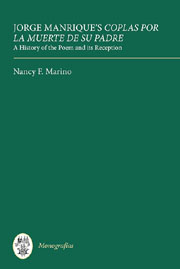Book contents
- Frontmatter
- Contents
- Dedication
- Acknowledgements
- Preface
- Chapter 1 The Author and His work
- Chapter 2 The Renaissance and Baroque Eras
- Chapter 3 Reception in the Eighteenth to Twenty-First Centuries
- Chapter 4 Shifting Literary Perspectives
- Afterword
- Appendix A Five Centuries at a Glance: A Selection of Comments about the Coplas
- Appendix B Additional Literary Responses since 1800
- Bibliography
- Index
Chapter 3 - Reception in the Eighteenth to Twenty-First Centuries
Published online by Cambridge University Press: 05 February 2013
- Frontmatter
- Contents
- Dedication
- Acknowledgements
- Preface
- Chapter 1 The Author and His work
- Chapter 2 The Renaissance and Baroque Eras
- Chapter 3 Reception in the Eighteenth to Twenty-First Centuries
- Chapter 4 Shifting Literary Perspectives
- Afterword
- Appendix A Five Centuries at a Glance: A Selection of Comments about the Coplas
- Appendix B Additional Literary Responses since 1800
- Bibliography
- Index
Summary
The Coplas in the Eighteenth and Nineteenth Centuries
The fate of Jorge Manrique's Coplas in the eighteenth century is closely linked to the tendencies and development of literary studies throughout the period. The Neoclassical era, with its concern for cultural progress, saw the birth of literary historiography as a discipline, resulting in the systematic classification of literary texts colored by prevalent cultural attitudes. Before this time the field of history was generally limited to accounts of military actions but it slowly expanded to include scientific and cultural topics. The term “literature,” however, had a much more extensive meaning, encompassing knowledge of all kinds, and rarely including belles lettres, literature of artistic or aesthetic merit (Carnero 1: 108–09). This is the state of the question in 1757 when Gregorio Mayans y Siscar published his influential Rhetorica, where he offers this definition of literary history:
La historia literaria refiere quáles son los libros buenos i quáles los malos, su méthodo, estilo i uso; los genios i ingenios de sus autores; los medios de promover sus adelantamientos o de impedirlos; los principios i progressos de las sectas eruditas; las universidades literarias; las academias i sociedades de varias ciencias, i el estado de la literatura en ellas; i el adelantamiento o descuido de las naciones en cada género de ciencia.
(2: 501)This seems to be the line of inquiry that brothers Rafael and Pedro Rodríguez Mohedano followed in their encyclopedic Historia literaria de España (1766–91), which can probably be considered the first systematic attempt to write such a work.
- Type
- Chapter
- Information
- Jorge Manrique's 'Coplas por la muerte de su padre'A History of the Poem and its Reception, pp. 95 - 134Publisher: Boydell & BrewerPrint publication year: 2011



